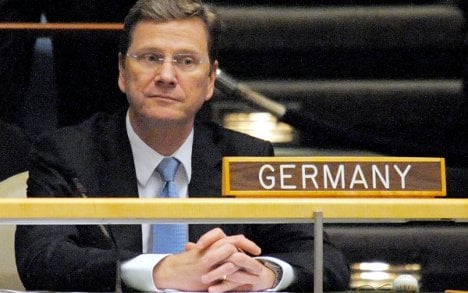After months of intense lobbying, Germany managed to secure a two-year term in the world’s most important body on Tuesday.
German Foreign Minister Guido Westerwelle hailed the show of support for Berlin in the UN General Assembly as proof the world considered Germany a reliable member of the international community.
Westerwelle said Berlin would use its time on the Security Council to promote nuclear disarmament and development. But on Wednesday he dismissed suggestions that Germany’s extra foreign policy clout would require a greater financial and military commitment to the United Nations.
Speaking to broadcaster Deutschlandfunk, Westerwelle also said Berlin hoped to push forward a comprehensive reform of the world body – which would include more permanent members on the Security Council.
The German government has made no secret it would like to have a perpetual spot at the table, but the papers in The Local’s media roundup on Wednesday had few illusions about Berlin’s real foreign policy heft on the world stage.
“Germany is in no way a great power,” summed up the right-wing daily Die Welt succinctly. But the country’s role as the world’s fourth-largest economy still carries some weight among UN members. “And Germany also now provides troops to combat zones, no longer believing it can buy its military innocence by writing fat cheques.”
The paper also said the fact that Berlin won the seat in a first round of voting in the UN General Assembly proved Westerwelle’s lobbying had paid off.
“Westerwelle was successful in the end, but he would be well advised not to tout his triumph too loudly,” wrote Die Welt, explaining Germany’s victory was a result of its support for a multilateral foreign policy.
The left-wing Frankfurter Rundschau said Westerwelle must use Germany’s time on the Security Council to strengthen the United Nations and combat the widening gap between the world’s rich and poor.
“Foreign policy doesn’t end with overly friendly words, abstract agreements and trite declarations,” wrote the paper, arguing Westerwelle must give the UN precedence over more exclusive international groupings like the G8. “Only then could the vote in New York turn out to be great opportunity for Foreign Minister Westerwelle and for Germany.”
The centrist Berlin daily Der Tagesspiegel warned Germany’s increased influence would also bring added responsibility.
“A seat on the Security Council is as much a burden as it is an honour,” opined the paper. “The next two years will offer Germany few opportunities to shine, but plenty of trying moments for German diplomats in New York.”
Despite Westerwelle’s attempt on Wednesday to pre-empt calls for greater financial support and troops for UN missions, Der Tagesspiegel said that’s exactly what Germany’s higher foreign policy profile could demand, pointing to the ongoing conflict in Afghanistan, Iran’s contentious nuclear programme and Middle East peace efforts as just a few of the challenges the international community faced.
The Dresden-based regional daily the Sächsische Zeitung wrote that the big boys’ club on the Security Council had no incentive to cede power to other nations, making a permanent spot for Germany unlikely. Therefore it was better to make an effort to empower the UN to act more quickly in a crisis, it wrote.
“Anyone who talks of a permanent seat for Germany after this result ignores the realities of world politics,” it wrote. “To the US, Russia, China, Britain and France, reform would mean a relinquishment of influence in favour of south Asia, Latin America and Africa, whose nations have no voice in the exclusive club.
“It is much more important to give the body more authority to react quickly in crisis situations and make clear decisions during conflicts.”
The Local/mry/dw



 Please whitelist us to continue reading.
Please whitelist us to continue reading.
Member comments